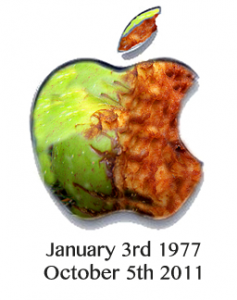 Apple Computer has long been the target of the controlling elite. Immediately after challenging the fascist mainframe computer world with individual personal computers, intelligence agencies worldwide feared the power that shifted from major corporations into the hands of the people. Before long Apple was backed by Fidelity Investments in order to expand their business and meet the growing demand for their Apple II computer. With that shift came a board of directors, new management, and a slew of failed product designs specifically targeted at giving Big Blue their chance to play catch up.
Apple Computer has long been the target of the controlling elite. Immediately after challenging the fascist mainframe computer world with individual personal computers, intelligence agencies worldwide feared the power that shifted from major corporations into the hands of the people. Before long Apple was backed by Fidelity Investments in order to expand their business and meet the growing demand for their Apple II computer. With that shift came a board of directors, new management, and a slew of failed product designs specifically targeted at giving Big Blue their chance to play catch up.
By the end of the 1970s, Apple had released the failed Apple III and the $10,000 Apple Lisa. The momentum that Steve Jobs and Steve Wozniak imparted on the world was drying up quickly, and IBM was about to take the world by storm with their inferior, but affordable Personal Computer or PC. Steve Jobs, frustrated with the demise of his company, captured a group of software and hardware developers and masterminded the Apple Macintosh from 1982 to 1984.
Again, Apple was on top of the personal computer world with both a computer and an operating system that would redefine everything in personal computing. Newly hired John Sculley pushed to have the computer priced out of range, and thus slowed sales from an explosion as previously enjoyed by the Apple II to questionable sales that had to be defended at every board meeting and press release.
Along comes the Windows operating system which was soon co-oped by the Central Intelligence Agency as an open operating system that would allow the government to spy on any file on your computer, and Apple was soon sabotaged into the ground. At every turn, when clear decisions would have made Apple the number one operating system in minutes, key players within the organization voted down chances to put the dying company’s OS on the IBM platform in direct competition with the new Windows 95.
During an 11 year hiatus, Steve Jobs struggles to get his NeXT hardware and operating system off the ground and into the mainstream lexicon of world computing. Based on the governments widely developed UNIX operating system, NeXT was the premiere system in terms of hardware performance, development ease, and forward-looking integration of not only desktop software, but the internet functions within that software. Yet, NeXT as of 1993 was reduced to a software company, and a dying one at that.
Mysteriously Steve Jobs takes on a new client during his venture at NeXT, the CIA. One can only speculate at the inner workings of their relationship that has been played down as a “niche client” in the press, but we think it is clear that with the resurgence of Apple in the mainstream computing world, and the cascading and easily avoidable foul ups of Microsoft releasing one disastrous version of Windows after another, Apple was poised to take back the world of personal computer like no other.
Since Steve Job’s debut back at Apple, and up until his death in 2011, Apple created the number one personal computer in the world, the iMac, the number one music player in the world iPod, the number one phone in the world the iPhone, and unquestionably the best operating system adopted from NeXT OS X.
Apple’s Demise
But now we’ve seen a change. Apple is promoting the death of the personal computer in lieu of handheld devices with a fraction of the functionality. Where competitors can’t compete in desktop publishing and overall home computer use, Apple is begging their customers to cease buying those items. Where the competition can eat Apple’s lunch in music players, tablets, phones, and other handheld solutions, Apple is unanimously giving away their patents, their innovation, and their best forums for originality.
Competitors are being given the green light from justice systems worldwide to steal everything Steve Jobs and company have pioneered since his return in 1996. Government owned search engines are funding massive campaigns to develop new operating systems, computers, phones, tablets, music players, and virtually all of the software used on them, but nothing changes the fact that prior to the iPhone, no phone looked like the iPhone. Prior to the iMac, all-in-one designs had failed miserably. Apple has earned its patents despite the world’s refusal to grant them protection.
As Steve Jobs mention prior to his death, he was going to devote their entire bank account to taking back the competitors who have ripped off their innovation. Now with the introduction of Tim Cook, the dream of Apple owning their creativity has ended. We fear he is nothing more than a shill to hand over the company to the competitors who have already been co-oped by the agencies that want to have a one stop shopping outlet for all things surveillance. We predict it will be a slow demise, and historians will refute the assertions that Apple did anything but die a logical death, but one thing is for certain, someone will be on top of this technology. There will not be a diverse list of vendors supplying these solutions. There will most likely be a duopoly and Apple will not be in the mix.
Enjoy the fumes of innovation before they are scooped up by shadow organizations that fund companies that have slogans that read “Don’t be evil.”
